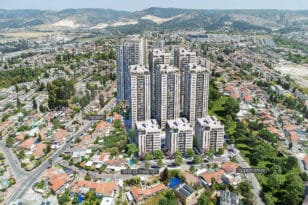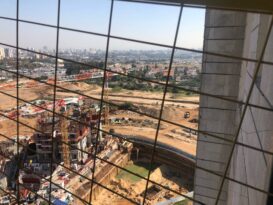A new bill proposed would allow developers to convert up to 30% of the built-up area in some office buildings into residential apartments. The government hopes that this move will address the urgent need to increase apartment supply while making use of the enormous surplus of approved office plans. The initiative, which fits into the modern planning approach of “mixed-use development,” is expected to help provide a solution to the housing crisis, especially for singles and couples without children.
This week, the Interior Affairs Committee of the Knesset approved an amendment to the Planning and Building Law which aroused a lot of interest, along with quite a few arguments. The proposed amendment for mixed-use development in Israel makes it possible to convert construction plans designated for offices for residential use – without the need to apply for approval for a new plan. Developers would be able to convert 30% of the total built-up area into small residential units of up to 50 square meters each. Through this plan, the government intends to promote the construction of thousands of small apartments in the heart of business areas throughout the country. While it still needs to pass two more votes in the Knesset before getting final approval, this week marked a significant step forward.
The main motivations behind this law are the intertwined issues of a shortage of housing supply and soaring Israel real estate prices. Increasing the supply of apartments has become one of the most complex and pressing challenges faced by the new government’s Ministry of Interior, which is responsible for the Planning Committee and the Ministry of Housing and Construction. Meanwhile, alongside the severe shortage of residential apartments, the data indicates a huge surplus in approved plans for office buildings – far beyond the actual needs of the Israeli market.
Although the move came mainly out of the desperate need to increase the supply of apartments in Israel, the initiative happens to fit in well with the current urban planning trends that encourage mixed-use development. Starting in the early 1960s, most modern cities were designed to separate areas of commerce, business, industry, and residential buildings into different physical complexes. Today, this approach is considered outdated, and cities around the world are making a significant effort to move in a different direction.
Israel’s housing crisis stems from the property tax structure
The explanatory memorandum to the bill explains that the high demand for residential construction combined with the shortage in supply leads to skyrocketing real estate prices. Meanwhile, there is an enormous surplus of office space. “The scope of the planned employment areas in Israel is estimated at about 250 million square meters, while the average annual volume of realization stands at only 7.1 million square meters,” it says. According to these numbers, the amount of land currently zoned for office spaces is expected to suffice for more than 30 years at the current rate of construction. “This significant excess prevents efficient land use, reserving extensive areas for business usage that are not expected to be implemented in the coming years.”
The overflow in planned business areas compared to the shortage of residential areas is not accidental. The imbalance stems from the amount of property tax paid to local authorities. Municipalities collect a low tax on residential buildings, which does not cover all the services provided by the authority to its residents. For income-producing real estate areas, including offices, industry, and commerce, however, municipalities collect a high property tax. This creates a situation where many municipalities promote plans for employment areas, even though they know it is highly unlikely that the plans will actually be implemented, due to the low level of demand.
The proposed plan includes integrating both residential and public buildings into business centers
Under the new proposal for mixed-use development, real estate developers in Israel will be able to apply for building permits on plots zoned for business and commercial use, in which up to 30% of the total areas allowed for construction will be designated for residential apartments. This is a win-win situation: integrating residential construction will increase the economic viability of the project, so there is a greater likelihood of developers building in these areas. This will increase revenues for the local authorities, while simultaneously increasing the housing supply.
Most importantly, the conversion from business to residential will be carried out when issuing the building permit, without requiring developers to apply for approval for a brand new plan – a process that can take several years. “It will be possible to add thousands of housing units each year in the short term, thereby meeting the government’s goals of increasing the housing supply,” the proposal stated.
Meanwhile, in order to meet the needs of the public that come along with adding residential units in Israel, the proposal for mixed-use development aims to authorize the local planning committee to allow additional construction areas for public use at a rate of up to 10% of the total approved building areas. These buildings would include daycares, kindergartens, student clubs, seniors’ centers, and so on.
The proposal elicited mixed reactions from the public
Many industry professionals claim that it is unlikely that this experimental initiative for mixed-use development will garner the necessary support and cooperation from both municipalities and buyers in Israel, who may not find the office areas suitable for their needs. However, the Israel Builders Association (IBA), which represents contractors in Israel, welcomed the decision. Either way, due to the size and location of the units, it is clear that the target audience for this plan is not families, but rather students, singles, and couples without children.
According to IBA president, Raul Srugo, “This is a very important step in increasing the supply of apartments. We welcome the decision of the ministers and Members of Knesset to accept the association’s proposal, which was presented to the government several years ago. This move will increase the supply of apartments in areas where office space has not been implemented, and it is another step toward curbing housing prices in Israel. “








